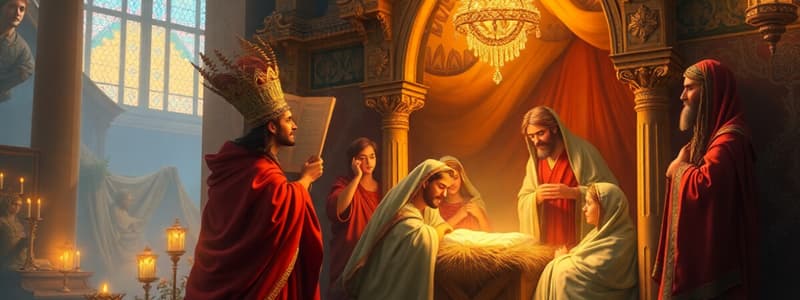Podcast
Questions and Answers
What does the term 'Messiah' literally mean?
What does the term 'Messiah' literally mean?
- The anointed one (correct)
- The king of kings
- The savior of the world
- The chosen one
The Messiah in Judaism will be a supernatural being.
The Messiah in Judaism will be a supernatural being.
False (B)
Who is acknowledged as the Messiah by Christians?
Who is acknowledged as the Messiah by Christians?
Jesus
The future era initiated by the coming of the Messiah is called _____ (Olam Ha-Ba).
The future era initiated by the coming of the Messiah is called _____ (Olam Ha-Ba).
Match the characteristics of the Messiah with their descriptions:
Match the characteristics of the Messiah with their descriptions:
What is NOT one of the expected outcomes of the Messianic Age?
What is NOT one of the expected outcomes of the Messianic Age?
The Messianic prophecies in the Old Testament are believed to be written exclusively for the Jewish people.
The Messianic prophecies in the Old Testament are believed to be written exclusively for the Jewish people.
What biblical text refers to the necessity to fulfill prophecies regarding the Messiah?
What biblical text refers to the necessity to fulfill prophecies regarding the Messiah?
The Greek term equivalent to 'Messiah' is _____ .
The Greek term equivalent to 'Messiah' is _____ .
Match the characteristics with the expected actions of the Messiah:
Match the characteristics with the expected actions of the Messiah:
Who led Israel into captivity in 605 BC?
Who led Israel into captivity in 605 BC?
David began to reign over all Israel at the age of 30.
David began to reign over all Israel at the age of 30.
What was the primary promise made to Abraham in Genesis 12:1-3?
What was the primary promise made to Abraham in Genesis 12:1-3?
The scepter shall not depart from _____ until Shiloh come.
The scepter shall not depart from _____ until Shiloh come.
Match the following ancient empires with their respective actions towards the Israelites:
Match the following ancient empires with their respective actions towards the Israelites:
What was the primary intention of God's governance through the Kingdom of David?
What was the primary intention of God's governance through the Kingdom of David?
The temple in Jerusalem was destroyed only once.
The temple in Jerusalem was destroyed only once.
What significant event does Hanukkah commemorate?
What significant event does Hanukkah commemorate?
After the Roman invasion, _____ was installed as King of the Jews.
After the Roman invasion, _____ was installed as King of the Jews.
What was the timeframe of the Babylonian captivity?
What was the timeframe of the Babylonian captivity?
Flashcards
Israel's captivity in Babylon
Israel's captivity in Babylon
Israel was taken into exile by the Babylonians from 605 to 539 BC.
Return from Exile (Medo-Persia)
Return from Exile (Medo-Persia)
King Darius allowed the Jews to return to Jerusalem and rebuild their lives and city.
Hellenism in Israel
Hellenism in Israel
The attempt by Antiochus to force Greek culture and language on the Jewish people.
Herod as King
Herod as King
Signup and view all the flashcards
David's Kingdom
David's Kingdom
Signup and view all the flashcards
Israel's Exodus
Israel's Exodus
Signup and view all the flashcards
The Promise to Abraham
The Promise to Abraham
Signup and view all the flashcards
Kingdom of David
Kingdom of David
Signup and view all the flashcards
Roman Invasion
Roman Invasion
Signup and view all the flashcards
Jacob's prophecy
Jacob's prophecy
Signup and view all the flashcards
Messiah
Messiah
Signup and view all the flashcards
Messianic Prophecy
Messianic Prophecy
Signup and view all the flashcards
Messianic Age
Messianic Age
Signup and view all the flashcards
Characteristics of the Messiah
Characteristics of the Messiah
Signup and view all the flashcards
Olam Ha-Ba
Olam Ha-Ba
Signup and view all the flashcards
Jesus Christ
Jesus Christ
Signup and view all the flashcards
Christos
Christos
Signup and view all the flashcards
King David
King David
Signup and view all the flashcards
Jewish Law
Jewish Law
Signup and view all the flashcards
Temple Restoration
Temple Restoration
Signup and view all the flashcards
Study Notes
The Political World at the Time of the Incarnation
- The political landscape during the time of Jesus' birth was complex, with various powerful nations influencing the region.
- Key political powers included Babylon, Medo-Persia, Greece, and Rome.
- These powers interacted with and impacted the Jewish people.
The Fall and Promise
- God cursed the serpent (likely representing evil). This curse involved movement on the belly and eating dust (Gen 3:14-15).
- God promised enmity (opposition) between the serpent and the woman (representing humanity), their offspring (seed). The woman's offspring (Jesus) would ultimately defeat the serpent / evil (Gen 3:15).
The Promised Land
- God promised Abraham a land (Gen 12:1-3).
- This promise was associated with blessing through Abraham, blessing those who bless him and cursing those who curse him.
- All families of the earth would be blessed through Abraham.
- The land and the Abraham's descendants were central to the Jewish identity and history.
Israelite Bondage and Exodus
- The text lists key events: Deliverance from Egypt, the journey in the wilderness, and the inheritance of Canaan.
- These events were significant in Jewish history.
God's Intended Kingdom
- God intended the Kingdom of David to spread His rule (Theocracy) globally.
- A prophecy (Genesis 49:10) foretells Judah's continued leadership, a lawgiver's role, and a future gathering of people under the leadership of Shiloh (a figure believed to be a future Messiah).
David's Reign
- King David began his reign at age 30.
- He initially ruled over Judah alone but subsequently reigned over all Israel (7 years and six months later).
Israel's Failures
- Israel's failures as a nation resulted in captivity under foreign powers.
- Numerous attempts to rebuild and restore the nation followed periods of captivity and exile. The Temple was destroyed and rebuilt multiple times.
Major Political Rulers
- Nebuchadnezzar of Babylon led Israel into exile (605 BC).
- Medo-Persia allowed the Jews to return and rebuild Jerusalem.
- Greece (Antiochus) tried to Hellenize Jews.
- Rome imposed heavy taxes on Jews and impacted daily life.
Hellenist Culture
- Greek language spread throughout the Roman Empire.
- Resistance from the Maccabees (Hanukkah) was an example of Jewish cultural and religious resistance to cultural assimilation.
- The installation of Herod as King by the Romans was reflective of the political changes of the era.
Prophetic Predictions of Messiah
- Belief in the eventual coming of the Messiah ("mashiah") was a fundamental part of both Judaism and Christianity.
The Messianic Idea in Judaism
- The term "Messiah" (mashiah) means "anointed one", in reference to the ancient practice of anointing kings.
- The future Messiah is prophesied to be anointed as king "at the End of Days" to bring the Jewish people to a state of freedom, peace, and harmony.
- The Messiah is a human, not a god or a superhuman figure.
The Messianic Age
- When the Messiah arrives they establish the Messianic age ("Olam Ha-Ba") an era characterized by peace among nations, natural harmony, Jews returning to Israel, acceptance of Jewish religion, the absence of sin and evil, and a restored temple.
The Messianic Idea in Christianity
- Christians identify Jesus as the Messiah.
- The term "Messiah" translates to "Christos" (or Christ) in Greek. The concept of a Jewish Messiah was integrated into Christianity.
- Jesus' life and ministry fulfilled Messianic prophecies.
The Messianic Declaration
- Jesus stated that all earlier prophecies concerning him needed to be fulfilled and were spoken of in the law of Moses, prophets, and psalms.
Studying That Suits You
Use AI to generate personalized quizzes and flashcards to suit your learning preferences.




